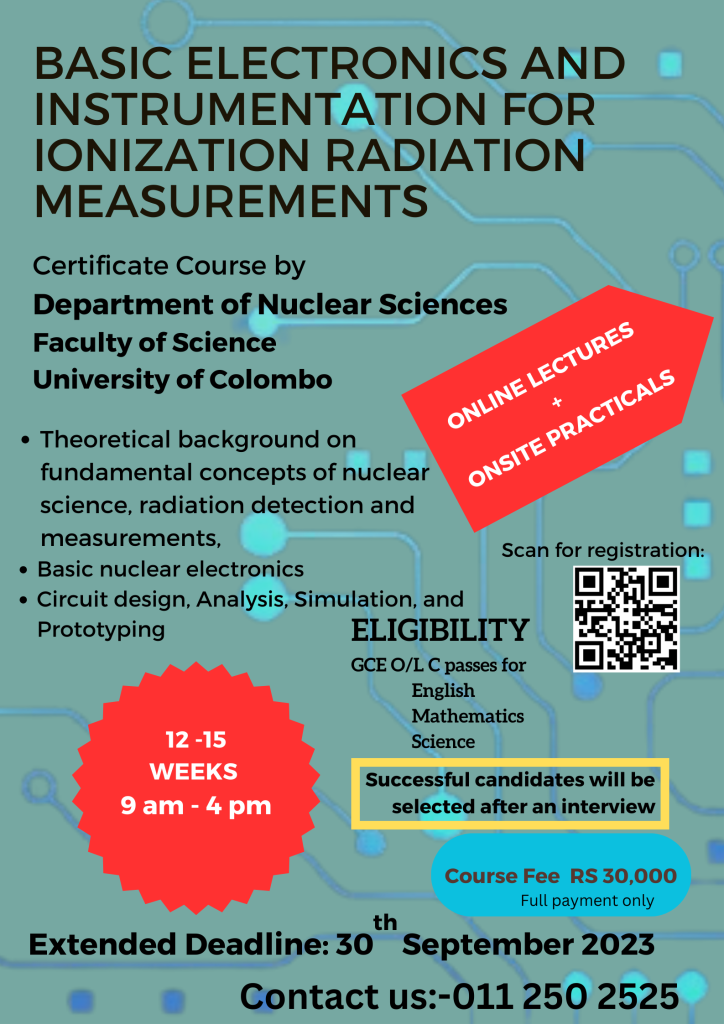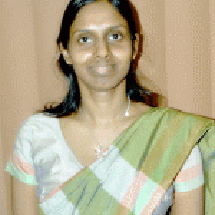Conducted by the Department of Nuclear Sciences, Faculty of Science, University of Colombo
Nuclear electronics is a specialized field of electronics that deals with the design, development, and application of electronic devices and systems for measurement, control, and manipulation of nuclear radiation. This field has evolved over the years with the advancements in technology, and today, nuclear electronics plays a crucial role in various fields such as medicine and pharmaceutics, food and agriculture, industries, environmental monitoring, security inspection, etc.
For any radiation detection application, basic understanding of nuclear detectors is essentially important. Furthermore, nuclear instrumentation is not only about the electronics but also the nuclear physics theories that enable us to understand radiation measurements and analysis.
This course is an introduction to the basic nuclear science instrumentation. It will also introduce general electronics which can be applicable in instrumental operations such as oscilloscope function generators, PCR analyzing equipment that will be applied in general electronic laboratories as well as some customized applications. For those who are interested in working in nuclear industries, such as nuclear reactors, cyclotrons, nuclear power plants, and nuclear waste management this course will give an added value. Knowing the electronic background of nuclear devices is an essential part of routine maintenance and troubleshooting. This certificate course intends to provide the essential knowledge to work with such devices and maintenance so that the candidates can gain a general understanding of electronic instruments as well as specialized training on radiation measurement devices. With the recent economic crisis and scarcity of foreign exchange, imported new electronic devices and parts have severe shortage. Under such circumstances, basic electronic knowledge application can be very much beneficial to develop homemade devices and troubleshooting existing instruments.
In addition to the basics of electronics and nuclear instrumentation, this course covers data analysis and processing that would help to build up the problem-solving capacity of electronics and nuclear electronics devices. At the end of this course, students should be able to apply basic electronic knowledge, instrumental development, troubleshooting and apply the knowledge to radiation and nuclear applications.
Minimum entry requirements
General Certificate of Education Ordinary Level or equivalent
Course structure
- 12 weeks (3 months)
- Contact hours on Saturdays (8.00 am to 12.30 am)
HOW TO APPLY?
Registration link
Course objective
To provide a sound theoretical basis for the fundamental concepts in Biotechnological applications
For whom?
Radiation workers and any other interested personals
Course Fees
LKR 30,000
Payment method: Direct bank deposit/online
Beneficiary Name: Colombo Science and Technology Cell
Account No: 1116016487
Bank: Commercial Bank of Ceylon PLC
Branch: Reid Avenue
- Please write your name clearly in the deposit slip and “PRAC_IMB_2025_Intake 01″ under the description section of the bank payment slip/online
- Payment can be made at any Commercial Bank branch.
- Please upload a scanned copy of the bank slip or the e-receipt as proof of payment
Intended learning outcomes
At the end of the course, the students will be able to:
Explain the basic electronic components, concepts, and laws
Demonstrate the basic radiation detection and measurements.
Explain working principles of radiation detectors and electronic design
Design circuit and construct printed circuit board
Data processing using embedded electronics
Course Details
Introduction to basic electronic components
Resistors, capacitors, Inductors, diodes, Transistors, Op-amps, NE 555 timing IC, Digital logic ICs and their theories, problem-solving, and applications. Laws related to Electronics and circuits analysis techniques.
Measures and quantities in electronics and instrumentation
Multi-meter to measure resistance, voltage, current, capacitance, Inductance and etc. Oscilloscope to measure pulse parameters of different types of wave forms/signals. Vernier caliper and micrometer screw gauge. Radiation measuring instruments and related units.
Working principles of radiation detectors
Concepts of sensors and parameters related to them. Working principles of Gas-filled detectors (Ionization chamber, Proportional counter, and GM tube), Scintillation detectors, and semiconductor-based detectors.
Radiation sources
Type of radiations: Alpha, Beta, Gamma, X-ray and neutron radiations. How to protect yourself and handle them. How to identify them using appropriate radiation monitoring instruments.
Power Suppliers
Type of battery, rechargeable battery technology. Switching mode power supply basic and technology to design low voltage power supply and high voltage power supply. Voltage rectifying, smoothing, Zener diode voltage regulator power supply, and IC base power regulation. Variable power supply. Voltage and current limitation circuit.
Filters and Wires
Type of noise and technique to avoid them, Active filters, Passive filters theories, and circuits. Coaxial cables, BNC data and high voltage connectors.
Basic circuit design
Circuit designing using a simulation platform get the results, physically manufacturing circuit using vero board, dot board, and PCB designing using CAD software. Print circuit board using toner transfer methods. Soldering and their techniques.
Signal processing
Designing counters using logic IC, seven segments, NE 555 timer. Signal processing using Arduino base circuit LCD, OLED displays. Variable voltage using PWM. Introduction to Field Programmable Gate Arrays, Introduction to Arduino-based microcontroller data processing.
Nuclear instruments / modules
Radiation Detectors, Preamplifier, Main amplifier, Counter/Timer, NIM Standards and NIM BIN modules, etc.

Assessment criteria
Practical examination (20%), theory examination (40%), and final project (40%) you need to construct an instrument followed by a demonstration with a detailed report submission. Successful candidates will be awarded certificates for Distinction (75-100%), Merit (60-74%), or Pass (40-59%). Below 40% will be considered unsatisfactory, and only a certificate for participation will be awarded based on active participation (50% assignment submissions) to these candidates.
Recommended Reading:
- The Art of Electronics (Textbook by Paul Horowitz and Winfield Hill)
- Principles of electronics (S. Chand, V. K Mehta, Rohit Mehta)
- Radiation Detection and Measurement (Glenn E Knoll)
Arduino Project handbook (Mark Geddes) - The Circuits and Filters Handbook Third Edition (Wai-Kai Chen)
- Printed Circuit Handbook (Clyde F. Coombs, Jr)
- How to Solder Electronics (SRA Soldering Products)
- Radiation Protection and Safety of Radiation Sources: International
- Basic Safety Standards (IAEA)
- Identification of Radioactive Sources and Devices (IAEA)
Curriculum Development Committee members:
- Dr M R Lamabadusuriya, Department of Nuclear Science, University of Colombo
- Dr. K. Jayananda, Department of Physics, University of Colombo
- Dr. C S Sumithrarachchi, Senior Scientist, FRIB, Michigan State University, USA
- Mr. C Kasige (MSc), Retired Director General, Sri Lanka Atomic Energy Board
- Mr. Dushan Dinushka (MSc, Electronics), University of Colombo School of Computing
Further Information
For more inquires please contact

Email: manuja.lama@nuclear.cmb.ac.lk
Tele: 011 250 2525
